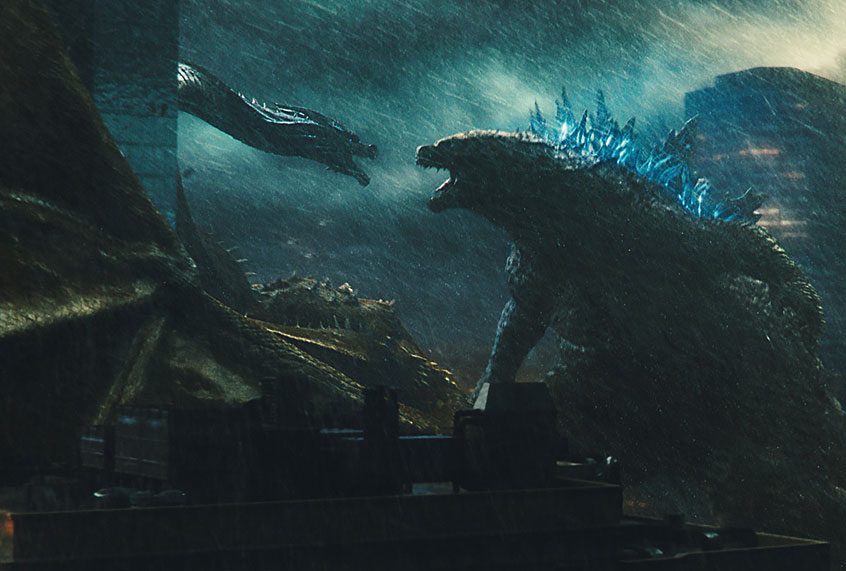This is a Godzilla movie, so if you watch it expecting non-formulaic storytelling, you’ll be disappointed. Then again, “Godzilla: King of the Monsters” doesn’t need an original story: Like all kaijū movies, it only requires awesome monsters, epic fight scenes and some subtle social commentary.
Like the 2014 “Godzilla” film, which effectively rebooted the franchise (it is the 35th film overall in the series), the story matters less than the underlying lore. Most important to the lore is its central premise: Giant monsters like Godzilla, known as Titans, are ancient beings that used to rule the planet and are reclaiming it for themselves, showing human beings how insignificant and powerless they are in the process. In the 2014 movie (as well as the 1954 original), Godzilla was awakened and/or empowered by the irresponsible use of technology, particularly misused nuclear weapons. That event proves to be the catalyst for unleashing a world of giant monsters who fight with each other, at our expense, in dozens of sequels. Sometimes the monsters fight on our behalf and sometimes not, but in the end we are merely their “pets,” as one character aptly puts it; they are in charge, and Godzilla is their king.
That’s the lore. Against this we have, as other critics have noticed, a routine plot. In “Godzilla: King of the Monsters” the two protagonists are Dr. Mark Russell (Kyle Chandler) and his ex-wife Dr. Emma Russell (Vera Farmiga). They are joined in the story by their precocious daughter Madison (Millie Bobby Brown), a standard issue military antagonist named Colonel Alan Jonah (Charles Dance), twin mythologists Dr. Ilene Chen and Dr. Ling Chen (Zhang Ziyi), an all-knowing character whose genius is so obvious that it’s remarkable no one listens to him (Ken Watanabe reprising the role of Dr. Ishirō Serizawa from the 2014 movie) and a series of other kaijū genre archetypes. You can predict every plot beat here, from how things will play out in the main conflict — between those who support Godzilla as humanity’s best hope against the evil Titans and those who want to kill Godzilla — to how the characters in the dysfunctional family subplot will grow or redeem themselves.
The main point of a movie like this, though, is to see the big monsters fighting — and it is in this crucial way that “Godzilla: King of the Monsters” delivers.
The stars of the show are Godzilla and Mothra, who are more or less the “good guys,” and Rodan and King Ghidorah, who pose the direct threat to humanity’s survival. While the special effects lean a bit too hard into their CGI, which can make the monsters look unconvincing at times, they’re realistic-looking enough that the fight scenes give that adrenaline rush which fans of kaijū movies have come to demand. Even better, Godzilla himself has a certain charisma to him here that makes you actively want him to win, and not simply because he’s technically on humanity’s side. He has a dignity to him when he is in repose, a regal strength when he is triumphant and a poignant suffering when he is nearly dead or defeated. There have been monster movies where I felt like I was watching mindless beasts (or, more accurately, soulless special effects) and wasn’t invested at all in what happened to them. I cared about Godzilla’s fate in “Godzilla: King of the Monsters,” which says something.
There is also, as mentioned before, a bit of social commentary in any good “Godzilla” movie — and this one is no exception. Here it happens as Dougherty’s characters explain how human beings are destroying the planet through our environmental depredations, a suitable substitute for the original movie’s emphasis on the dangers of nuclear weapons, and the Titans are a corrective to the scourge of human beings. The film isn’t preachy in making its point, but it is intriguing how the plot really couldn’t work without it. The idea isn’t that humanity was hunky-dory until these Titans came around squashing things; it is rather that people were screwing things up on the planet and needed to be contained, like a plague, lest we cause too much damage. This is where Godzilla comes into play as a force for balance, as well as a metaphor for the damage we are causing our planet.
A word must be said about Michael Dougherty, who directed and co-wrote this film with Zach Shields (the two men came up with the story alongside Max Borenstein). This is Dougherty’s third feature-length film as a director: the first, 2007’s “Trick ‘r Treat,” is a Halloween-themed horror anthology that brilliantly subverts linear storytelling techniques to enhance its subplots a la “Pulp Fiction” (I count it among my all-time favorite movies); the second, 2015’s “Krampus,” is a clever and gory tribute to ’80s holiday horror flicks.
Dougherty has a knack for figuring out exactly what it is that draws fans to specific genres and then making films that work as carefully-crafted Valentines. “Trick ‘r Treat” was his best film because it played with genre conventions in a way that elevated the material above its B-movie origins (including but not limited to the non-linear storytelling format). “Godzilla: King of the Monsters” isn’t quite as transcendent — nor does it aspire to be — but it works because it realizes that Godzilla fans want a mixture of mythology, spectacle and parable.
One could say that with a less predictable plot and more original characters, “Godzilla: King of the Monsters” would have been a better movie, transcending its genre and breaking new ground. Perhaps it would have been a masterpiece if Dougherty had done for a “Godzilla” movie what “Trick ‘r Treat” did for horror anthologies. Yet what he did instead — make the best possible traditional “Godzilla” movie, by tapping into why kaijū movies are appealing in the first place — is quite impressive. If you want to see a great “Godzilla” movie, look no further.

